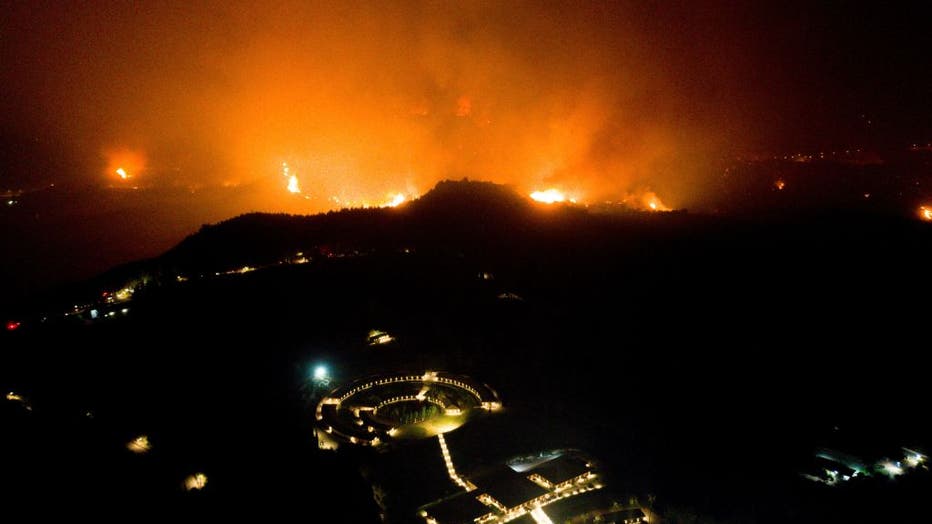Birthplace of Olympics threatened as Greece battles forest fires
LIMNI, Greece - One of the major forest fires burning in Greece amid a protracted heatwave threatened the archaeological site at the birthplace of the modern Olympics as the Greek military prepared Thursday to increase its involvement in preventing new blazes from raging out of control.
Firefighters waged "an all-night battle" to protect the archaeological site from the fire in the southern Greek region of the Peloponnese near ancient Olympia, Citizens Protection Minister Michalis Chrisochoidis said. The site is where the Olympics were held every four years from 776 B.C. for more than a millennium.
"We will continue the battle all day in order to contain all the fronts and extinguish the fire. The conditions are difficult," Chrisochoidis said, congratulating the firefighters for what he described as heroic efforts so far.
The same area was ravaged by wildfires in 2007 that killed dozens of people but spared Olympia’s ruined sports venues and temples.
The fire department said 174 firefighters, 9 ground teams, 52 vehicles, two water-dropping planes and four helicopters were tackling the fire, which broke out Wednesday.

A wildfire approaches the Olympic Academy in ancient Olympia in western Greece on August 4, 2021. (Photo by -/Eurokinissi/AFP via Getty Images)
A heatwave that authorities have described as Greece's worst since 1987 has baked the country for more than a week and is forecast to last until at least Sunday. It has sent temperatures spiraling to 45 degrees Celsius (113 F) and created tinder-dry conditions in shrubland and forests.
Neighboring countries face similar conditions, fueling deadly and widespread wildfires in Turkey and blazes in Italy and across the Mediterranean region. Officials in Albania said one person died of smoke inhalation near the southern city of Gjirokaster.
In Turkey, a wildfire that reached the compound of a coal-fueled power plant in the southwest, forcing residents to flee in boats and cars, was contained Thursday after raging for some 11 hours.
But others continued to burn. Turkey’s worst wildfires in decades have raged for nine days amid scorching heat, low humidity and constantly shifting strong winds. The fires have so far killed eight people and countless animals.
A European Union disaster response group said firefighters and water-dropping planes were being sent from EU members to Italy, Greece, Albania and North Macedonia.
The EU Atmosphere Monitoring Service said smoke plumes from the region’s wildfires were clearly visible in satellite images, which also showed that the intensity of the wildfires in Turkey was at the highest level since records started in 2003.
Greece saw more than 100 wildfires break out over 24 hours from late Tuesday to late Wednesday. Defense Minister Nikolaos Panagiotopoulos said Thursday that the armed forces would expand its role in fire prevention, with ground and air patrols over areas vulnerable to wildfires. The air patrols are being carried out by both manned and unmanned aircraft, he said.
"The armed forces are always present in difficult times, and so they are now," Panagiotopoulos said.
A major fire that broke out Tuesday was ravaging forests on the island of Evia, near the Greek mainland, leading to the evacuation of villages. The coast guard evacuated around 90 people from a beach.
More than 160 firefighters, three planes and three helicopters, as well as five ground teams and 57 vehicles were deployed to the wildfire in Evia.
France's civil protection agency said 40 French firefighters and eight tons of material had headed to Greece late Wednesday to assist in the Evia blaze.
To the north of the Greek capital, a forest fire that encroached into northern suburbs, burning dozens of homes and forcing thousands of people to flee, was continuing to burn. The fire, which started Tuesday, was no longer threatening inhabited areas but was still decimating forest areas at the foot of Mount Parnitha. Forty firefighters from Cyprus had joined Greek colleagues in that blaze.
"We are making a titanic effort on many fronts," Civil Protection chief Nikos Hardalias said late Wednesday. "According to our threat forecasts, tomorrow too is expected to be a difficult day ... The toughest part lies ahead of us, the next days and weeks will be even harder. Our key target is to protect human lives."
Greek scientists said the total destruction in just three days this month in Greece exceeded 50% of the average area burned in the country in previous years. An Athens Observatory report said an estimated 6,000 hectares (14,800 acres) went up in smoke between Sunday and Wednesday, compared to 10,400 hectares in the whole of last year.
The causes of the Greek wildfires were unclear, but authorities say human error and carelessness are most frequently to blame.
RELATED: Devastating: Dixie Fire levels small California town
____
Becatoros reported from Argostoli, Greece

